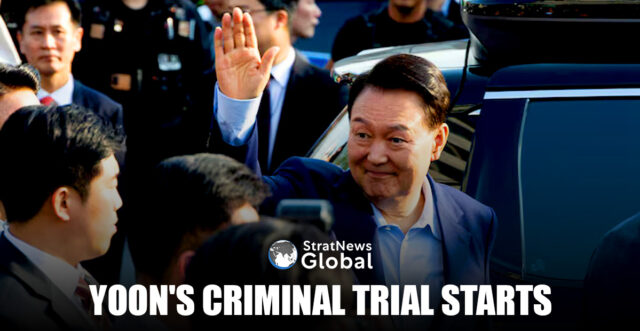The criminal trial of South Korea’s ousted leader Yoon Suk Yeol began on Monday, with prosecutors accusing him of leading an insurrection by declaring martial law late last year, sparking months of unrest.
Yoon’s declaration that martial law was needed in part to root out “anti-state” elements was lifted six hours later after parliamentary staffers used barricades and fire extinguishers to ward off special operations soldiers trying to enter parliament, where lawmakers voted to reject martial law.
Move To Avert ‘Legislative Dictatorship’
After departing his house in a motorcade, Yoon, who has denied all charges against him, entered a courtroom at the Seoul Central District Court on Monday, wearing a dark navy suit.
At the start of proceedings on Monday, prosecutors argued Yoon lacked the legal grounds to declare martial law and accused him of trying to paralyse state institutions such as parliament.
Yoon has said that he had no intention of paralysing the country, and that martial law was needed to show how the majority opposition party was conducting “legislative dictatorship” by repeatedly blocking his government’s agenda.
The charge of insurrection faced by the impeached leader is punishable by life imprisonment or even death, although South Korea has not executed anyone in decades.
‘Challenge To Democracy’
Yoon was removed by the Constitutional Court from office earlier this month for violating constitutional powers with actions that were labelled “a serious challenge to democracy”.
His martial law declaration on December 3 shocked South Koreans, and created chaos in all areas of society, the economy and foreign policy, the Constitutional Court said.
The upheaval has further exposed deep social rifts between conservatives and liberals and stepped up pressure on institutions and the military, which had found itself in a quandary over whether to enforce martial law.
The former president returned to his private home on Friday from the official residence, with crowds of conservative supporters turning out to greet his motorcade.
He remains defiant and has pledged to “stand by” his supporters. The opposition Democratic Party criticised Yoon on Monday as delusional for not making any sincere apology.
Snap Elections
The country will now hold a snap election on June 3. Questions remain over whether Yoon might still play a role.
Lee Jae-myung, the opposition leader who is leading presidential polls, visited on Monday a start-up that develops artificial intelligence chips, pledging to ease regulations with aggressive investments in the AI industry.
For Yoon’s criminal hearing on Monday, two senior military officers are expected to take the witness stand.
One of them, Cho Sung-hyun from the army’s capital defence command, already testified at the Constitutional Court in February that he was ordered to send troops to “drag” lawmakers out of parliament during Yoon’s martial law order rollout.
Yoon has denied this allegation.
(With inputs from Reuters)





